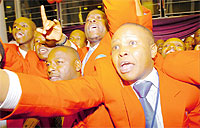Despite Raging Bear Run at NSE, All is not Lost

As the stock market reels under the global financial crisis, contrasting with the bull run realized in early 2007, and lack of investor confidence, a group of investors are feeling most of the heat with their stocks plunging below issue prices. Never mind the fact that some of the victim companies surpass their industry average performance and experts forecasting a bright outlook.January analysts report card gives NSE an empty return.
New IPOs
As most analysts expect more Initial Public Offers of most companies this year, Investment advisers, brokers and investors alike might be taking a back seat before venturing to take up the Offers for sale coming their way.Kenya Pipeline is set to be made public(read an analysis by Bankelele) In fact the Government offered papers are now more secure and give better returns on Investments and this might have informed the issuance of the Infrastructure Bond by the Government mid this week.
Kenya has budgeted over Sh51 billion in infrastructure bonds comprising Sh33 billion and Sh18 billion through a debut international sovereign bond and long term domestic bonds respectively to finance rehabilitation and expansion of the road network.At the onset Treasury has issued a Sh18.5 billion infrastructure bond.Potential investors expected to take up this issue include commercial banks, insurance firms, pension funds and private firms.
Market Performance
Overall, all investors at the Nairobi Stock Exchange have lost considerably if the market performance gauge —the NSE 20-Share Index— and market capitalisation are anything to go by.The index has been oscillating around the 3100 and 3500 mark and the psychological 3000 mark might surpassed what with the low investor confidence, considerable erosion of the investments in most counters and low trade turnovers. The bear run might persist butr not for long as it is a cycle like in any other market of the world.
20 Share Index and NASI
In close to 3 years, the index has slid from a high of 6161 points recorded in February 2007,opening levels of 5016 points for 2008 and peak of 5445.66, on June 9, and the NASI has declined by 41.13 per cent from a peak of 116.243 to 68.52 in the same period.
Global Financial Crisis
The global financial crisis has exacerbated the situation as foreign investors, who were expected to cushion the stock against any panic sale, have joined the retail investors in offloading the stock to consolidate their investments and probably explore other possible investments in other emerging market that promise to retunr good earnings on investments.
Strong Fundamentals
The above notwithstanding, the Kenyan financial market is still growing stronger by the day and though the effects of contagion might be felt, it is not all that bleak a future after all.
A company like Safaricom that entered the market with alot of expectations amongst the investing public remains fundamentally strong,though its shares have slid below the Sh5 offer price since they debuted at the NSE on June 9 this year, and oscillating around sh 3 by the end of January 2009.
Most Profitable Company
Safaricom is currently ranking as the most profitable listed company in Eastern Africa, whose only undoing has been the huge supply of the 40 billion listed shares into a market that previously had a mere 15 billion shares which brings in a case of poor structuring by the investment advisors for the IPO or the greed to raise so much money from the public that would stop at nothing to acquire the company.
Profitability
Safaricom saw its pre-tax profit rise to Sh8.9 billion for the six months ending September 30 last year, up from Sh8.7 billion recorded over similar period in 2007, is strong since it controls about 80 per cent of the market and is operating in a growing industry—Information and Communication Technology.
Regional Comparison
Compared to its regional counterparts, the NSE has registered the biggest loss so far since the beginning of the year.












